Genetics and Biotechnology
Research thematic areas
I Whole genome sequencing of candidate species and pathogens
Whole genome of Penaeus indicus was sequenced and assembled. The genome (1.93 gb) could be assembled in 11171 scaffolds, with N50 value of 34.4 Mb.
A circos plot comprising of 6 tracks (scaffold, contigs, genes, CDS (sense and antisense strand), GC content) shows the features of Penaeus indicus
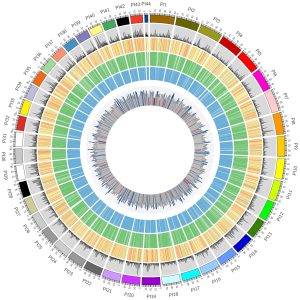
The complete genome of Vibrio campbelli was sequenced and assembled. The size of the genome was 5.46 Mb.

Genome Similarity of V.campbelli LB102 with Strain: 170502.
Vibrio parahaemolyticus genome was completely sequenced and assembled. The size of the genome was 4.99 Mb.
Genome Similarity of V. parahaemolyticus with Strain: RIMD 2210633 O3:K6

II Development of Bioinformatics tools
A bioinformatics tool ‘Missing Regions Finder’ (MRF) was developed: We developed MRF tool which rapidly tabulates and depicts complete and partial missing CDS in a query genome when compared to a reference genome. The MRF can be accessed at http://bioinfo.ciba.res.in/mrf/

First open-access SNP search database ‘dbVAST’ for shrimp was developed. The database, dbVAST (database of Variations Associated with Shrimp Transcripts) contains about 27,991 and 21,970 SNPs for indicus and P. vannamei respectively. Can be accessed at http://bioinfo.ciba.res.in/dbvast/

III Application of biotechnology in reproduction
Serotonin enhanced ovarian development in Penaeus indicus: Manipulation of endocrine system by eyestalk ablation or treatment with serotonin resulted in enhanced ovarian development in captive Penaeus indicus .
Histological section of ovaries of the fishes treated with serotonin)

Vitellogenin antibody based non-invasive sex detection in Mugil cephalus : Assays of vitellogenin combined with sex steroid quantification in plasma can be a potential tool for non-invasive procedures for sex identification of grey mullet, Mugil cephalus.
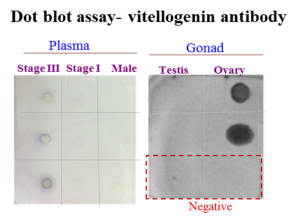
IV Population Genetic studies
Genetic population structure of pearlspot fish: ATPase 6/8 genes was used to study the population structure of pearlspot fish present in nine different locations across Indian coast. The study revealed distinct and sub-structured pearlspot populations in Indian waters.
Phylogenetic tree distinctly separate the pearlspot populations into three clades. Clade 1: Pulicat stock Clade 2: Ratnagiri and Goa stock Clade 3: Chilika, Nagayalanka, Vellayani, Vemabanad, Ashtamudi and Mangalore stocks
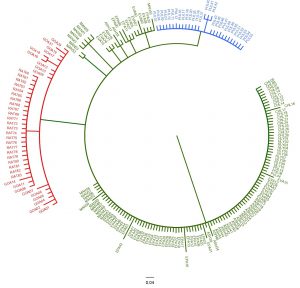
Population genetics study of Penaeus indicus: mitochondrial 16S rRNA gene was used on a total of 121 individuals representing seven populations from distant parts of India were used for the study. Our study exhibits a polyphyletic relationship in Indicus between Kakdwip (West Bengal) and other populations.
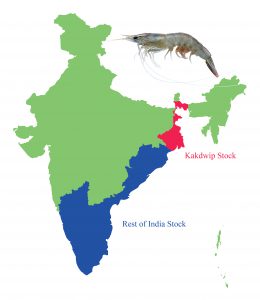
Identification of brackishwater model fish, Oryzias javanicus from Indian waters: The Javanese ricefish, Oryzias javanicus (Bleeker, 1854), was recorded for the first time from the natural waters of India. The Muttukadu lagoon population of Oryzias sp. was identified morphologically as Oryzias javanicus, supported by genetic data. The breeding of ricefish has been standardized in captive conditions.
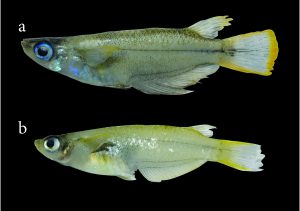
Research projects – in operation
| No | Title | Funded By | Period |
|---|---|---|---|
| 1 | Integrating biotechnological and bioinformatics approaches for molecular and genetic characterization of brackishwater fish and shellfish candidate species (PI: Dr. M. Shashi Shekhar) | ICAR-CIBA | 2022-2024 |
| 2 | Genomic resources for augmentation of economic traits in Indian white shrimp Penaeus indicus and whole genome sequencing of brackishwater aquaculture candidate species (PI: Dr. M. Shashi Shekhar) | ICAR | 2021-2024 |
| 3 | Network Project on Investigations on dietary alterations in shrimp for abiotic stresses using nutrigenomics approach (PI: Shri Ashok Kumar Jangam) | ICAR | 2022-2024 |
| 4 | Unravelling signatures of growth and salinity adaptation in Etroplus surentensis through omics approaches (PI: Dr. Vinay Kumar Katneni) | DBT | 2022-2024 |
Research projects – completed recently
| No | Title | Funded By | Period |
|---|---|---|---|
| 1 | Outreach activity on fish genetic stocks | ICAR | 2008-2019 |
| 2 | Whole genome sequencing of Indian white shrimp Penaeus indicus | ICAR | 2015-2020 |
| 3 | Poverty alleviation through prevention and future control of the two major socio-economically important diseases in Asian Aquaculture | DBT | 2016-2019 |
| 4 | Application of advanced molecular and bioinformatic tools for improvement of brackishwater fish and shellfish | ICAR-CIBA | 2018- 2021 |
Laboratories/facilities
- Genetics and Bio-technology laboratory
Patents granted / applied
- Patent No:308703 on “Development of gene specific probe and primers for detection of Indian isolate of Mourilyan virus in Penaeus monodon shrimp by realtime PCR” issued on 17th June 2013 Valid till June 2033
- Patent No:308704 on “Development of nested RT-PCR for detection of Indian isolate of Mourilyan virus in Penaeus monodon:” issued on 17th June 2013 Valid till June 2033
Scientist Team
Nutrition
Research thematic areas
Develop cost-effective, environmentally sustainable, efficient, and indigenous feed processing technologies for the brackishwater aquaculture candidate shell and finfish species for their all-life stages.
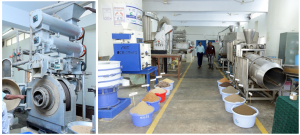
Develop functional feeds for broodstock, larvae, and specialty feeds to address the niche markets.
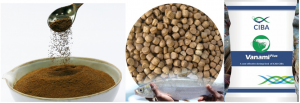
Carry out extensive research on the utilization of novel feed ingredients in the aquafeed formulation.
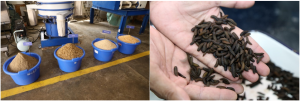
Develop cost-effective indigenous feed technology to cater to the aqua farmers and entrepreneurs of the country.

Human resource development, hands-on training, and consultancy to the various stakeholders in aquaculture nutrition and feed technology.

Research projects – in operation
| No | Title | Funded By | Period |
|---|---|---|---|
| 1 | Sustainable aqua feed formulations and feeding approaches for improved growth and health. (PI: Dr. K. Ambasankar) | ICAR-CIBA | 2022 |
| 2 | Solid state fermentation technology for development of cost effective customized plant protein products as fishmeal alternate for shrimp feed (PI: Dr. J. Syama Dayal) | DBT | 2022-2024 |
| 3 | Agricultural Drones Project (PI: Dr. K.P. Kumaraguru vasagam) | Department of Agriculture & Farmer’s Welfare | 2022-2023 |
| 4 | Evolving brackishwater aquaculture technologies and its dissemination for livelihood security of Sundarban farmers (PI: Dr. Debasis De) | ICAR-CIBA | 2022-2023 |
| 5 | Captive Breeding of Hilsa, Tenualosa ilisha: Phase II (PI: Dr. Debasis De) | NASF | 2022-2023 |
Research projects – completed recently
| No | Title | Funded By | Period |
|---|---|---|---|
| 1 | Newer Feed resources and feed additives for development and improvement of shrimp and fish feeds | ICAR | 2014-2018 |
| 2 | Outreach activity on Fish Feeds | ICAR | 2014-2018 |
| 3 | Outreach activity on nutrient profiling and evaluation of fish as a dietary component | ICAR | 2014-2018 |
| 4 | Novel approaches for development and improvement of sustainable shrimp and fish feeds | ICAR | 2018-2021 |
| 5 | Outreach activity on fish feed and nutrient profiling of brackishwater fish and shrimp | ICAR | 2018-2021 |
Laboratories/facilities
CIBA possesses the state-of-art facilities to prepare different grades of sinking and floating pellets. Larval feeds (100 µ to 500 µ) and broodstock feeds for both Shrimp and Finfish have been developed. The modern feed processing machineries like ultra-fine grinder, Ring die pelletizer, Extruder, Spheronizer, vaccum coater and Spray dryer are effectively utilised to prepare the larval, broodstock and functional feeds. The division is having a fully equipped analytical and quality control laboratory with facilities for analysis of major and minor nutrients. A modern wet laboratory to carry out feeding experiments in different life stages of shrimp and fish is the additional forte to this division. A micro algal laboratory for screening, isolation, identification and culture of different microalgae is the recent addition to the list.
Feed analytical laboratory
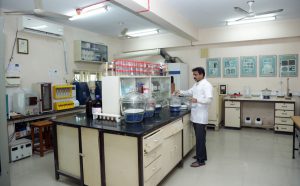
- Equipped to do the complete proximate analysis of feed, shellfish, finfish, macro and micro algae etc.
- Analysis of physical properties of formulated feed
- Equipped with Gas Chromatography (GC) and HPLC (High-performance liquid chromatography)
- Microcopy for feed and live feeds
- A pilot scale research feed mill is at Muttukadu Experimental Station of ICAR-CIBA
- Equipped to produce formulated feeds for all the candidate species in brackishwater aquaculture as well as for all the life stages
Feed biotechnology laboratory
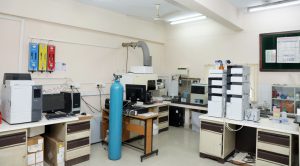
Pilot scale research feed mill
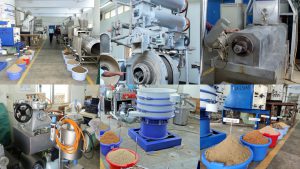
Patents granted / applied
- Fish remnant hydrolysate as plankton booster in aquaculture (Inventors: Debasis De, Sandeep, K.P., Sujeet Kumar, T. Sivaramakrishnan, Suvana Sukumaran, K. Ambasankar, K.K. Vijayan) Provisional specification No. 201941009741 dt. 13th March 2019.